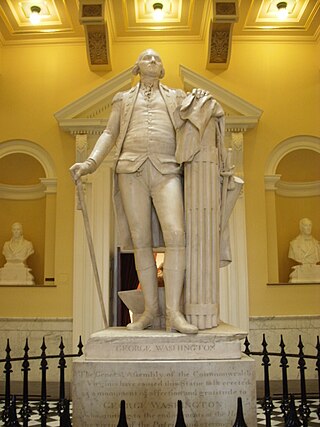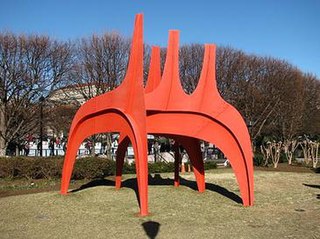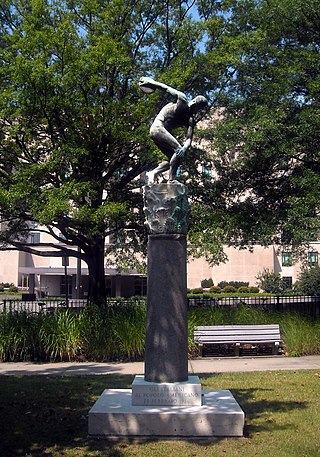
Alexander Calder was an American sculptor known both for his innovative mobiles that embrace chance in their aesthetic, his static "stabiles", and his monumental public sculptures. Calder preferred not to analyze his work, saying, "Theories may be all very well for the artist himself, but they shouldn't be broadcast to other people."

The National Museum of American History: Kenneth E. Behring Center collects, preserves, and displays the heritage of the United States in the areas of social, political, cultural, scientific, and military history. Among the items on display is the original Star-Spangled Banner. The museum is part of the Smithsonian Institution and located on the National Mall at 14th Street and Constitution Avenue NW in Washington, D.C.

Karl Theodore Francis Bitter was an Austrian-born American sculptor best known for his architectural sculpture, memorials and residential work.

Alexander Stirling Calder was an American sculptor and teacher. He was the son of sculptor Alexander Milne Calder and the father of sculptor Alexander (Sandy) Calder. His best-known works are George Washington as President on the Washington Square Arch in New York City, the Swann Memorial Fountain in Philadelphia, and the Leif Eriksson Memorial in Reykjavík, Iceland.

La Grande Vitesse, a public sculpture by American artist Alexander Calder, is located on the large concrete plaza surrounding City Hall and the Kent County Building in Grand Rapids, Michigan, United States. Popularly referred to as simply "the Calder", since its installation in 1969 it has come to be a symbol of Grand Rapids, and an abstraction of it is included in the city's official logo.

George Washington is a statue by the French sculptor Jean-Antoine Houdon from the late 18th century. Based on a life mask and other measurements of George Washington taken by Houdon, it is considered one of the most accurate depictions of the subject. The original sculpture is located in the rotunda of the Virginia State Capitol in Richmond, Virginia, and it has been copied extensively, with one copy standing in the United States Capitol Rotunda.

Aurora is a public artwork by American artist Mark di Suvero. It is in the collection of the National Gallery of Art and on display at the National Gallery of Art Sculpture Garden in Washington, D.C., United States.

Cubi XI is an abstract sculpture by David Smith. It is a part of the Cubi series of sculptures.

Cheval Rouge is an abstract sculpture by Alexander Calder.

The Daguerre Memorial is a bronze and granite sculpture by Jonathan Scott Hartley in Washington, D.C. It was erected in memory of Louis Daguerre.

Discus Thrower is a bronze sculpture in Washington, D.C. A copy of Myron's Discobolus, it is located in Edward J. Kelly Park, at 21st Street and Virginia Avenue, N.W. Washington, D.C. The architect was Rodolfo Siviero, and the founder was Bruno Bearzi.

Lunar Bird is an abstract bronze sculpture by Joan Miró. It was modeled in 1945, enlarged in 1966, and cast in 1967.

A bronze statue of a seated Benjamin Franklin by John J. Boyle is installed at the University of Pennsylvania in Philadelphia, Pennsylvania. It is located in front of College Hall, on Locust Walk, between 34th and 36th Streets, and is one of three statues of Franklin on the campus.

Samuel Gross (1897) is a bronze statue by sculptor Alexander Stirling Calder that was created as a monument to the American surgeon Dr. Samuel D. Gross (1805–1884). It was commissioned for and originally installed at the Army Medical School in Washington, D.C., on what is now the National Mall.
Morris Cafritz was a Washington, D.C. real estate developer, and philanthropist. As CEO of the Cafritz Company, he was Washington, D.C.'s largest private developer from the late 1920's to the early 1960's.

Eagle is an abstract sculpture by Alexander Calder. It is located at the Olympic Sculpture Park, Seattle.
Miriam Mörsel Nathan is an American visual artist. Her work is abstract and process based. Through the mediums of drawing and printing, the use of repetition and a combination of materials, she seeks to connect disparate elements and fragments in her works on paper. The driving force behind the work is to make whole what is not whole at all. She is also a published poet.

The Bex Eagle is a bronze sculpture located in Pershing Park, Washington, D.C.

Peggy Cooper Cafritz was an American art collector, educator, civil rights activist, philanthropist, and socialite.
















